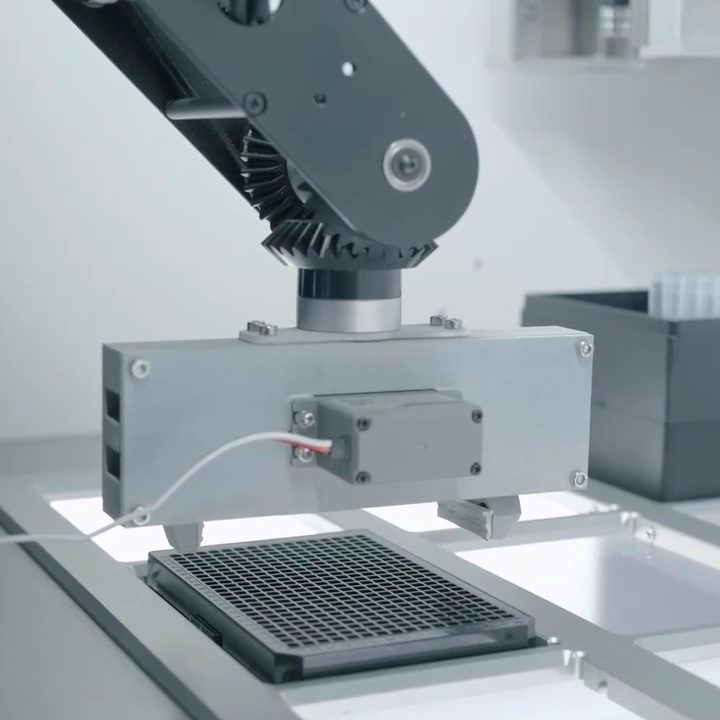Blogs
Stacking Precision: The Impact of Palletizing Robotics
In this blog, we delve into the domain of palletizing robots, outlining their purpose and operation, and exploring how they…
24 minute read
In This Article
In today’s world, human curiosity and scientific inquiry are at an all-time high. In this context, laboratories serve as the catalysts of innovation. While they have been the sites of numerous historic breakthroughs, the current age places a premium on precision and efficiency as the new benchmarks for success.
Enter automation — a game-changer with a twist, reshaping laboratory operations in ways you’ve never imagined.
Automation isn’t just a buzzword; it’s a dynamic approach to redefining lab efficiency, accuracy, and overall productivity.
In this article, we zoom into the process and discuss tasks that can be automated in a laboratory along with the benefits.
Laboratory instruments can be complex and require skillful operation, but automation rises to the occasion, surpassing mere button-pushing. To get an idea, imagine a laboratory where your equipment collaborates harmoniously, orchestrating experiments, collecting data, and even adjusting parameters autonomously. This not only minimizes human error but allows researchers to compose experiments with precision.
The precise handling of vials is a skilled process, but automation adds a sophisticated touch to it. Automated vial handlers can smoothly navigate the laboratory, loading and transporting vials with finesse, lowering the risk of contamination and preserving sample integrity. In pharmaceutical, chemical, and biological research, these actions can be truly transformative.
In labs where microplates are essential, automation takes the lead. Automated microplate handlers work with exceptional precision, efficiently managing microplates to reduce contamination risks and improve experiment efficiency. Whether you’re engaged in drug discovery or high-throughput screening, microplate automation will be a key factor in streamlining your processes!

Data analysis, often a slow process in laboratory work, experiences a significant boost with automation. Today, advanced software and machine learning algorithms have taken center stage, turning data into a dynamic landscape of insights. The outcome is quicker decision-making, stronger conclusions, and an acceleration in the progress of your research.
Regular equipment maintenance becomes a proactive routine with automation. Automated systems monitor your instruments and alert you when they need attention. This predictive maintenance not only minimizes downtime but also extends the lifespan of your valuable equipment, ensuring long-term reliability.
The management of laboratory supplies has never been as efficient as it is with automation, which not only enhances storage optimization but also leads to cost savings. It effectively tracks your inventory, making sure you always have the right supplies at the right time. This practical approach not only saves time but also prevents unnecessary expenses tied to having too much stock or making last-minute orders.
Dealing with industry regulations and keeping up with documentation becomes a breeze with automation. Automated systems simplify the process, generating audit-ready reports and making compliance a straightforward task. It’s all about making compliance smooth and efficient.

Integrating automation into your laboratory enhances efficiency and empowers researchers to plan and execute experiments with the utmost precision.
The benefits of lab automation include:
Researchers can allocate their time to the most critical tasks, accelerating the pace of discovery.
With automation, laboratories can optimize processes, leading to substantial cost savings over time.
Automation provides real-time data and insights, enabling swift and informed decisions.
Routine tasks are orchestrated, boosting productivity and maximizing your laboratory’s potential.
Automation eliminates the discord of human error, ensuring the reliability and repeatability of results.
Conclusion
It is well known that automation is not just a tool; it’s a conductor, directing the laboratory processes at multiple stages toward precision and efficiency. By automating the various tasks listed above, you can also elevate your laboratory’s performance, allowing your team to perform with artistic precision in the ever-evolving world of science.
Dorna’s robotic solutions are dedicated to designing and innovating robots that make highly efficient robotic arms incredibly affordable. It is so that all laboratories can catch on to this upcoming era and quality research can flourish.
Join the automation revolution with Dorna.
Blogs
In this blog, we delve into the domain of palletizing robots, outlining their purpose and operation, and exploring how they…
24 minute read
Blogs, Products
In this blog, we embark on a comprehensive exploration of the top challenges associated with the adoption of robotic arms…
29 minute read
Blogs
This blog explores different gripper types, their features, applications, and how they improve production efficiency.
32 minute read
Blogs, Products
Robotic arms are masters of manipulation, and their prowess lies in the intricate principles governing their operation. These principles play…
35 minute read